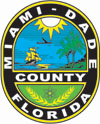
|
Miami-Dade
Legislative Item File Number: 151026 |

|
Miami-Dade
Legislative Item File Number: 151026 |
Printable PDF Format
 Clerk's Official Copy
Clerk's Official Copy
|
| File Number: 151026 | File Type: Resolution | Status: Adopted | ||||||||||||
| Version: 0 | Reference: R-500-15 | Control: Board of County Commissioners | ||||||||||||
|
||||||||||||||
| Requester: NONE | Cost: | Final Action: 6/2/2015 | ||||||||||||
|
||||||||||||||
|
||||||||||||||
|
||||||||||||||
| Sunset Provision: No | Effective Date: | Expiration Date: | ||||||||||||
| Registered Lobbyist: | None Listed |
Legislative History |
|||||||
| Acting Body | Date | Agenda Item | Action | Sent To | Due Date | Returned | Pass/Fail |
| |
|||||||
| Board of County Commissioners | 6/2/2015 | 11A4 | Adopted | P | |||
| |
|||||||
| Metropolitan Services Committee | 5/13/2015 | 2A | Forwarded to BCC with a favorable recommendation | P | |||
| REPORT: | Assistant County Attorney Gerald Sanchez read the title of the foregoing proposed resolution into the record. Commissioner Edmonson said she agreed with the item and pointed out that the County was already implementing a large portion of the proposal. She requested to be listed as a co-sponsor to the foregoing proposed resolution. Chairwoman Jordan and Commissioner Heyman also requested to be listed as co-sponsors to the foregoing proposed resolution. Hearing no further questions or comments, the Committee proceeded to vote on the foregoing proposed resolution, as presented. | ||||||
| |
|||||||
| County Attorney | 4/30/2015 | Assigned | Christopher C. Kokoruda | 4/30/2015 | |||
| |
|||||||
| County Attorney | 4/30/2015 | Referred | Metropolitan Services Committee | 5/13/2015 | |||
| |
|||||||
| Legislative Text |
|
TITLE RESOLUTION DIRECTING THE COUNTY MAYOR OR MAYOR�S DESIGNEE TO STUDY THE FEASIBILITY OF THE IMPLEMENTATION OF THE �CURE VIOLENCE HEALTH MODEL� IN MIAMI-DADE COUNTY AND TO PREPARE AND SUBMIT A REPORT BODY WHEREAS, �Cure Violence� is a community organization dedicated to the goal of reducing violence and was founded in 2000 by Gary Slutkin, M.D., Professor of Epidemiology and International Health at the University of Illinois at Chicago School of Public Health; and WHEREAS, �Cure Violence� has developed the �Cure Violence Health Model,� which is an interdisciplinary public health strategy that combines the science of violent behavior, elements of infectious disease control and community organizing to combat street violence on the frontlines; and WHEREAS, the �Cure Violence Health Model� has four core activities that work in conjunction to disrupt the transmission of violence: detection and interruption of potentially lethal events, intervention with highest-risk persons�or those thought most likely to be involved in potential events in the near future�changing group and community behavior and norms, as well as, data and monitoring; and WHEREAS, �Cure Violence� deploys culturally sensitive individuals who live in the community and can serve as credible messengers to high-risk individuals and groups, commonly referred to as �Violence Interrupters� and �Outreach Workers,� into targeted neighborhoods to defuse conflicts before they turn deadly and to stem retaliatory shootings; and WHEREAS, �Cure Violence� also utilizes grassroots community mobilization and public awareness campaigns to empower communities to speak up when violence takes place in their own neighborhood; and WHEREAS, in addition to street intervention, �Cure Violence� partners with elected officials, local activists, faith-based leaders and law enforcement in a cooperative effort to effect long-term change and create safer communities; and WHEREAS, other essential elements of the �Cure Violence Health Model� include adaptations of health strategies utilized to reduce transmission of deadly diseases, such as HIV/AIDS, cholera and tuberculosis; and WHEREAS, the �Cure Violence Health Model� has been successfully adopted in various domestic jurisdictions, including over 30 sites across nine cities in New York State, Chicago, New Orleans, Baltimore, Philadelphia, Oakland, San Antonio, and internationally in eight countries across five continents, including most recently in Syria; and WHEREAS, it is the intent of this Board to consider the implementation of the �Cure Violence Health Model� to improve public safety in Miami-Dade County; and WHEREAS, in light of the foregoing, this Board desires to have the County Mayor or Mayor�s designee study the feasibility of implementing the �Cure Violence Health Model� in Miami-Dade County, including but not limited to issues relating to: (1) determination of the most appropriate geographical areas of concentration, (2) engagement of community leaders, (3) identification of community partners, including law enforcement and hospital response partners, (4) technical assistance, and (5) potential fiscal impact of implementation, NOW, THEREFORE, BE IT RESOLVED BY THE BOARD OF COUNTY COMMISSIONERS OF MIAMI-DADE COUNTY, FLORIDA, that this Board: Section 1. Directs the County Mayor or Mayor�s designee to study the feasibility of the implementation of the �Cure Violence Health Model� in Miami-Dade County, including but not limited to issues relating to: (1) determination of the most appropriate geographical areas of concentration, (2) engagement of community leaders, (3) identification of community partners, including law enforcement and hospital response partners, (4) technical assistance, and (5) potential fiscal impact of implementation. Section 2. Directs the County Mayor or Mayor�s designee to prepare and submit a report detailing the findings, results and recommendations of the feasibility study to this Board within 90 days of the effective date of this resolution and place the completed report on an agenda of the Board pursuant to Ordinance No. 14-65. |
|
Home |
Agendas |
Minutes |
Legislative Search |
Lobbyist Registration |
Legislative Reports
Home | Using Our Site | About | Phone Directory | Privacy | Disclaimer
E-mail your comments,
questions and suggestions to
Webmaster
|